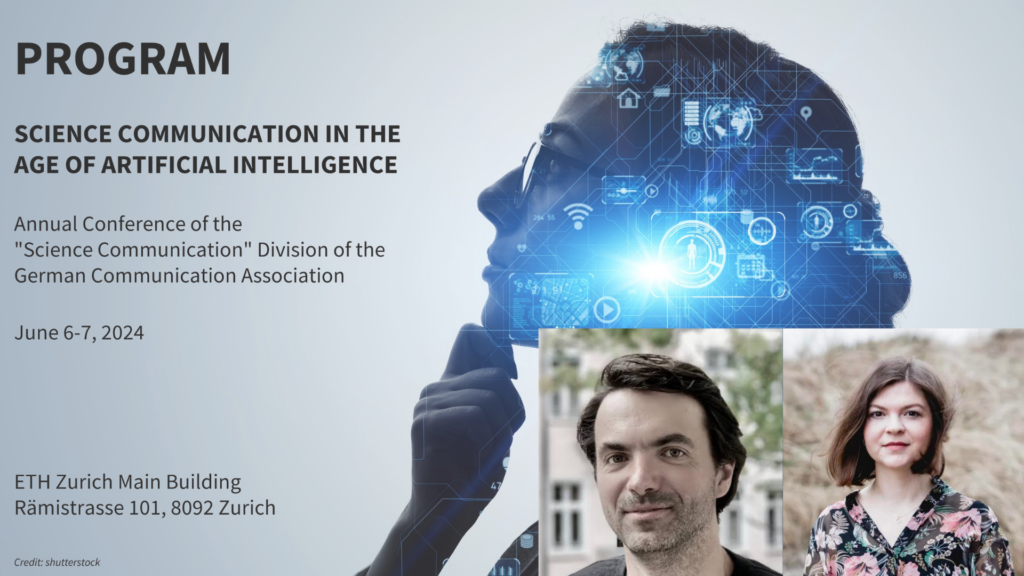
Vortrag an der Universität Zürich zu Imaginaries of AI verschiedener Stakeholder
5. Juni 2024
Morgen, am 5. Juni, werden die Lab-Mitglieder Prof. Dr. Christian Katzenbach und Vanessa Richter einen Vortrag zum Thema „Negotiating AI as a sociotechnical phenomenon: Competing imaginaries of AI by stakeholders in the US, China, and Germany“ halten. Der Vortrag thematisiert die Rolle und Positionierung verschiedener Stakeholder in der Debatte um KI auf Basis von Interviews mit KI-Expert*innen in Industrie, Politik, Wissenschaft, Medien und Zivilgesellschaft in den USA, Deutschland und China.
Negotiating AI as a sociotechnical phenomenon: Competing imaginaries of AI by stakeholders in the US, China, and Germany
Utopian and dystopian visions regularly dominate the public discourse on artificial intelligence (AI) (Cave & Dihal 2019). These normative debates around AI repeatedly revolve around the relationship between humans and machines, but increasingly also around how AI (re)consolidates existing discrimination and social inequalities. In these debates, we need to understand AI not just as a taken-for-granted object of science communication, but more importantly as a notion and sociotechnical phenomenon that is an object of negotiation. While AI is now routinely treated as self-evident (Suchman 2023), it is still very much under formation as a sociotechnical phenomenon itself, with public perception and discursive framing having considerable influence.
This paper builds on the concept of imaginaries to study how AI is being negotiated between stakeholders in the US, China, and Germany – and thus to “trace its sources of power and to demystify its referents” (Suchman 2023, p. 1). The early sociological work on imaginaries has highlighted the role of perceptions, discourses, and future visions in the complex interactions and negotiations of co-constructing technological developments (Anderson, 1983; Taylor, 2003). More recent work on sociotechnical imaginaries (SI) (Jasanoff & Kim 2009, 2015) as ”collectively held, institutionally stabilized, and publicly performed visions of desirable futures, animated by shared understandings of forms of social life and social order attainable through, and supportive of, advances in science and technology“ (Jasanoff, 2015, p. 4). enables the reconstruction of the multiple, contested and often commodified (Mager & Katzenbach 2021) discursive negotiations between different actors in processes of technological development and its integration into society. In a more concrete form (Richter et al. 2023) it offers a constructive framework to question the role of different stakeholders in shaping imaginaries around AI as well as the often contentious negotiation processes around different desirable future developments on AI innovation and application. .
This paper addresses producers and proponents of AI-related communication, based on interviews with AI experts in industry, government, academia, media and civil society from three countries USA, Germany, and China. While a number of studies have analysed national, industrial, and political visions of digital media and automation (Felt & Öchsner, 2019; Mager,2017), there is a lack of research analysing the negotiation of imaginations on potential futures of AI between stakeholders in the actual field of AI development. Additionally, there is often a strong focus on national comparison when considering different perceptions because national perceptions are closely associated with funding and the regulation of new technologies such as AI. However, national perception is not a homogenous and monolithic point of view but rather a heterogeneous and controversial discursive construction process. Against this background, this paper examines the imaginaries of different stakeholders in the field – industry, government, academia, media and civil society – in three leading countries in AI development and debate: the USA, Germany, and China.
The data collection is based on semi-structured interviews (15-20 per country) with AI experts from the mentioned stakeholder groups for each country. The transcribed interviews were analysed employing both situational analysis (Clarke, 2019) and critical discourse analysis (Wodak, 2015) to map the relational development of imaginaries across stakeholder groups as well as major emerging imaginaries on AI. By considering the situational aspects of imaginary development, we are able to map controversial discourses on AI impacting future visions of the technology and its perception. The analysis highlights that the negotiation of AI imaginaries does not necessarily take place in uniform ways across all stakeholder groups as (1) the US discourse can be mapped across several geographic AI centres, (2) while the German dataset revealed a focus on EU policy compliance and geographical distributions by stakeholder groups that led to localised AI imaginaries being foregrounded. Lastly, (3) the Chinese data emphasised a congruence with party policies minimising local specificities in the AI discourse. Moving beyond specific stakeholder groups to question the processes of national and international negotiation on future AI imaginaries reveals relevant intersections of imaginary building as well as the political and socio-technical agendas forming and disrupting current trajectories.
The analysis thus offers key results for understanding how AI as an object of (science) communication is actively negotiated between powerful stakeholders, based on data from the US, China, and Germany. As a result, the paper makes visible how discourses and strategic activities of stakeholders condense into widely shared sociotechnical imaginaries and shape global and local technical and social developments. The debate around AI plays a decisive role in shaping the future design of AI systems and their integration into social sub-areas and individual everyday life in times of profound automation.
Der Vortrag wird im Rahmen des Panels „Exploring Imaginaries of AI“ an der „Annual Conference of Science and Communication in the age of Artificial intelligence“ (aiscicomm) an der Universität Zürich gehalten. Die Universität Zürich ist Projektpartner des PGMT-Labs im Rahmen des laufenden Forschungsprojekts Imaginaries of AI, das darauf abzielt, die Wahrnehmung von KI in verschiedenen Ländern und im Laufe der Zeit zu erklären und zu vergleichen.
Das Programm und die Website der Konferenz finden Sie: hier
Mehr Informationen über das Forschungsprojekt Imaginaries of AI: hier

